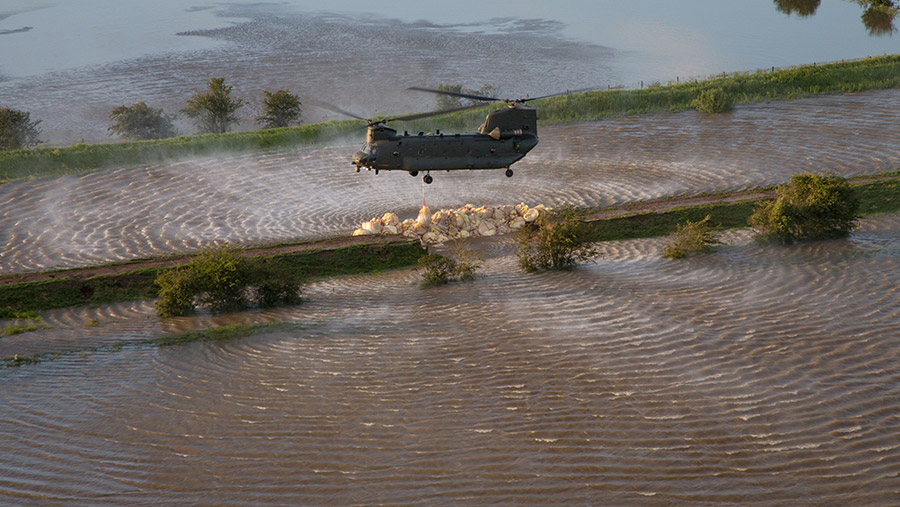Crops feared lost in Lincolnshire floods
 © Cpl Phil Major/BRITISH MINISTRY OF DEFENCE/HANDOUT/EPA-EFE/Shutterstock
© Cpl Phil Major/BRITISH MINISTRY OF DEFENCE/HANDOUT/EPA-EFE/Shutterstock Farmland remains flooded with crops feared lost after two months of rain fell in just two days in Lincolnshire.
Up to 220ha of wheat, oilseed rape and broccoli are understood to be under water, with four farms affected.
The Environment Agency said extreme rainfall had put stress on the River Steeping, which burst its banks at Wainfleet last week.
See also: Study highlights need for Fens flooding protection
The RAF dropped 270t of ballast in an effort to fill the breach.
Average monthly rainfall for June is 60mm, but some 132mm was recorded from 10-12 of June – with more expected in the coming days.
Two high-capacity pumps are now working to reduce water levels, but evacuated residents are not expected to be allowed back in their homes before Friday (21 June).
Higher ground
The deluge comes less than a month after the NFU warned that flood defences must be adequately maintained.
NFU East Midlands environment adviser Simon Fisher said: “We have identified four farms and between them they have about about 220ha of farmland under water.”
A herd of suckler cows with calves at foot have been moved to higher ground.
Mr Fisher said: “Water levels appear to be receding slowly – one of the farmers said to me he could now see ears of wheat sticking out of the top of the water.”
People and property were understandably taking precedence over farmland, said Mr Fisher – but it was important to learn lessons from the floods and how they happened.
“To put it bluntly, farmland is not a priority while they are trying to sort people and houses out – but we have put a marker down asking to know when it will be pumped out.”
Emergency services
The NFU was continuing to support its members while liaising with the emergency services and local internal drainage boards, added Mr Fisher.
“I have taken advice about how long crops can survive under standing water and I think we are at the point where we have probably lost them,” he said.
“When it drains away, all the crops are probably going to fall over anyway – it is going to be a bit of a mess.
Innes Thomson, chief executive of the Association of Drainage Authorities (ADA), said: “From what I have understood, the river wasn’t even particularly close to the top of the embankment.
“It was still well contained within the embankment, but the embankment breached before it was overspilling – so again that leads to us trying to understand why it happened,” he said. “It must have been a weakness in the embankment.”
Maintenance and management
The situation demonstrate exactly why the ADA is urging the government to put more focus on maintaining and supervise water management assets.
Three years ago, badgers were blamed for damage to flood defences around the River Steeping – prompting a parliamentary question from local MP Matt Warman.
The animals were doing a “huge amount of damage” to defences around the river, Mr Warman told the House of Commons in February 2016.
Concerns have also been raised about river maintenance work, with the Environment Agency facing calls for the river to be dredged more frequently.
The agency says it is spending £200m to maintain flood defences in 2018-19, with staff carrying out more than 90,000 inspections to ensure they are able to protect communities.
